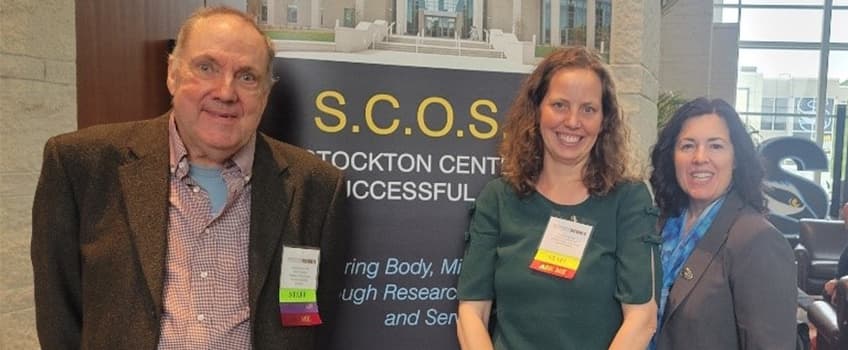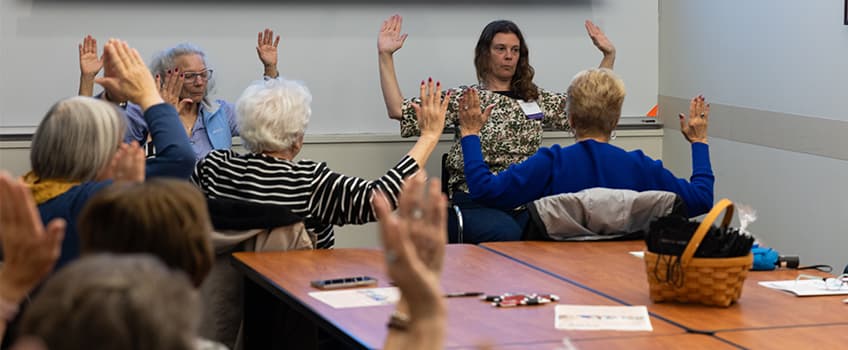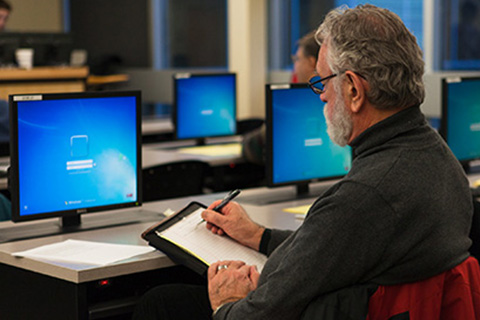Intergenerational Interactions Key to Center on Aging’s Future on Campus

Christine Ferri (center) and Jessica Fleck (right) have worked with the Stockton Center on Successful Aging's founding director, David Burdick (left), since the center's early days. Ferri and Fleck have since been promoted to director and assistant director of SCOSA, respectively.
Galloway, N.J. – Over the last 17 years, the Stockton Center on Successful Aging has grown from a two-person operation with few offerings into a hub of service and research specializing in the education, recreation and socialization of older adults in Atlantic County.
According to the new director, Christine Ferri, and assistant director, Jessica Fleck, growth and expansion top their agenda for SCOSA’s future.
As they begin their first year leading the center, they have big plans for the Stockton community. Here are the top three things to know about SCOSA’s future and new leadership.
#1: Ferri and Fleck are longtime SCOSA enthusiasts.
The faculty members both have a long history with the center. Ferri, an associate professor of Psychology, joined SCOSA under the direction of its founding director, David Burdick, in 2007. Fleck, a professor of Psychology, hosted various brain health and wellness talks with the center’s older adult participants beginning in 2008.
Ferri said she was sought after by Burdick due to her specialization in aging and mental health at Rutgers University. Over the years, her role in the center grew and changed, reflected by the many titles she carried, including education chair, Gerontology minor coordinator and research fellow.
“I've been involved in learning from Dave in that capacity throughout, so I feel well prepared to take over the director position because I've learned so much from what he's done and the ways that he’s brought the center from one person with two courses to having an office and staff on campus and being primarily grant funded,” Ferri said.
Fleck’s brain talks soon led her to begin researching lifestyle factors that enhanced brain function as one aged. She conducted her first SCOSA-funded research project in 2013 and got involved in summer intensive research experiences with students that included assessing cognitive function and brain activity in older adults.
“When I heard that Dave Burdick was leaving and that SCOSA was looking for an assistant director, I felt like it would be a good fit for me because I have always wanted to adopt more of a role within SCOSA and have felt that some of my strengths as a researcher would absolutely be a vehicle to help Stockton and SCOSA build a partnership that transitions into more of an academic center,” Fleck said.
#2: SCOSA’s centralization of successful aging programs has made Stockton the only Age-Friendly University in New Jersey.
SCOSA hosts a wide variety of initiatives and programs, such as the Stockton Institute of Lifelong Learning, which offers low-to-no-cost courses on various topics and interests; the Successful Aging Festival, which connects older adults to local resources; and various assessments on physical and mental health conducted by students and faculty.
This, in turn, has earned Stockton the designation of “Age-Friendly” by the international Age-Friendly University Global Network.
“The nice thing about being an interdisciplinary center is that we're pulling faculty from across the university with completely diverse interests who are all trying to understand both well-being in later life as well as some of the problems that older adults can encounter,” Ferri said. “(Fleck) is doing a great job helping SCOSA become the hub for that and making sure that everyone across the university who is doing this research has a home for it.”
#3: SCOSA’s role will expand from community engagement to intergenerational research and education involving Stockton students.
For Ferri and Fleck, the center’s role at Stockton will only continue to grow through new programs and more opportunities for students to interact with older adults in the community.
Ferri highlighted a new discussion series that will invite older community members to campus for an intergenerational conversation surrounding some of Stockton’s staple events like September’s Constitution Day and October’s Fannie Lou Hamer Human & Civil Rights Symposium. She hopes that this series, beginning this fall, will encourage older adults to see the fascinating speakers and get involved in the timely conversations that take place on campus.
Fleck is excited to expand the center’s educational and research opportunities for students. This fall, she, along with other faculty members and student researchers, plans to begin research on the correlation between brain activity and adventurousness. Older adults will come to Stockton’s EEG Lab for self-report measures, executive function measures and brain activity recording.
Both programs will have space for students to get involved as facilitators, researchers and more.
“Our goal is to not only increase the presence of SCOSA on campus but also to establish SCOSA as more of an academic center where we are supporting students, faculty, staff and community partners in research that involves older adults and aging broadly. Hopefully, we can establish a network of researchers on campus who are interested in or are currently conducting research with older adults or the aging process, and we can help build on that to provide the support and resources they might need,” Fleck said.
“The center will be for students learning how to do research and participating in community projects with older adults, whether they are healthy or in long-term care facilities or with a variety of medical or cognitive diagnoses that impact functioning,” Ferri said. “We want students to have exposure to the full range (of aging). We want to challenge the stereotypes of aging but also take care of people who need care.”
– Story by Loukaia Taylor
– Photos by Susan Allen
Successful Aging Festival Fosters Connections with Seniors
May 17, 2024

Galloway, N.J. — Megan Rinaldo credits her grandmother with why she tends to “lean toward helping seniors more.”
“My grandmother got custody of myself and my brother when I was just a year old. And she raised us. She taught us to respect everybody,” said the Stockton University junior. “I love helping people. That’s kind of my thing, but I especially love helping seniors.”
Rinaldo, 29, said she became more of her grandmother’s caretaker as she got older, and that led her to go back to school and transfer to Stockton’s Health Science program this year. It was also a big reason why the Millville native really enjoyed presenting a seminar on how smart devices, apps and artificial intelligence can benefit senior citizens at the university’s annual Successful Aging Festival on May 15.
Rinaldo joined Duo Helen Wei, associate professor of Computer Science, and fellow junior Emily Doto to discuss how apps such as Curable can manage chronic pain symptoms and Youper can address mental health issues.
— Story by Mark Melhorn
Emojis, Slang and (no) Punctuation: Finding the Balance in Communicating Across Generations
SPRING 2024 | CELEBRATE DIVERSITY DIGEST
The key to healthy partnerships in team environments is more than communication: it's comprehension as well. For this issue, Stacey Clapp, director of Strategic Communications, decided to focus on intergenerational communication and offered tips for avoiding miscommunication in both the workplace and the classroom.

Have you ever felt like you need to enlist a translator when you’re communicating with students? Or that younger coworker or “seasoned” colleague in another department?
That’s because the rules of communication are changing with each generation, and work is the one place everyone —from boomers to Gen Z— come together. These changes can have a big impact in the workplace and classroom.
Tips to Communicate Across Generations
So, how should you communicate with a multigenerational workforce?
It’s important to use multiple communication channels, including email, social media and videoconferencing to provide options for employees to choose a space where they are most comfortable. Be sure to tailor language so it is appropriate for the platform. When possible, personalized communication will make employees feel valued.
With many employees working remotely or on staggered shifts, integrating modern communication tools is essential for collaboration and sharing information. However, with a workforce that has varying comfort levels with these platforms, training and support is critical to ensure no one is left behind. Consider a gradual implementation to allow employees time to adapt and provide feedback.





